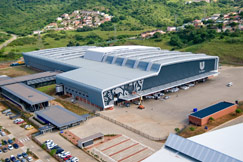Investing in South Africa
Unilever opens new, 'green' SA factory
Confidence in South Africa
Davies said the investment was a boost for manufacturing, production and building local capacity for such products, adding that the investment was in line with the objectives and priorities of South Africa's Industrial Policy Action Plan. "Such investments confirm that South Africa is indeed a preferred destination for investment," he said, adding that it also demonstrated the confidence in South Africa's manufacturing capability. "Our National Industrial Policy Framework has confirmed that [the] government sees the manufacturing sector continuing to play a pivotal role in ensuring that South Africa achieves higher rates of economic growth that we need. "Unilever has been a critical part of the process and we look forward to it continuing to play a role in ensuring that South Africa becomes an even more globally competitive manufacturing location, especially through increased investment in modern plant and energy efficiency, as well as skills development."Reducing carbon emissions
According to Unilever chief supply chain officer Pier-Luigi Sigismondi, the group aims to reduce its carbon dioxide emissions from manufacturing and logistics globally by over 40% by 2020 from its 1995 baseline, at a rate of almost 5% a year. "It is imperative for Unilever to respond positively to growing global demand for sustainably sourced products," Sigismondi said. "We will continuously reduce our impact across the entire lifecycle of our products and intensify the advancement of new technologies such as used here at Indonsa to achieve our global sustainability objectives." Carbon reduction is achieved by using energy efficiently controlled zoned lighting throughout the plant, while innovative insulation methods reduce heat loads from the sun to minimise air conditioning requirements. Super-efficient motors drive mixers and air compressors, reducing energy requirement levels substantially. Rain falling on the 22 000 square meter roof is channelled into a 1.5-million litre tank, treated and added to recycled water. The application of smart water efficiency technology virtually eliminates municipal supply, enabling the recovery of 70% of all water used in production phases.Waste energy plant
Other examples of water saving include capturing and treating condensate from air-conditioning, and using it to clean toilets. All process and shower water is recycled via biological and reverse osmosis treatment. The plant's solid waste is recycled to levels where nothing goes to landfill. This achieved by using recoverable packaging materials. Product waste will be designated for composting in local gardens that support poor communities, while excess is converted by a waste energy plant and the resultant energy is fed back into the national energy grid. "The advanced technology in operation at Indonsa sets new global standards in responsible and sustainable dry food production. It embodies our resolve to simultaneously improve the lives of people and to entrench respect for the environment," said Unilever South Africa chairman Marijn van Tiggelen. SAinfo reporter
Would you like to use this article in your publication or on your website? See: Using SAinfo material
 Unilever's state-of-the-art dry foods factory outside Durban is one of the company's largest worldwide (Photo: Unilever)
Unilever's state-of-the-art dry foods factory outside Durban is one of the company's largest worldwide (Photo: Unilever)
Related links
Related articles
- SA open for investment: Gordhan
- SA a global hub for Ford's diesel engines
- Hong Kong, SA companies in oilseed JV
- Intel Capital invests $5m in SA's Altech
- FDI into Africa on the increase: survey
- Ramaphosa takes over McDonald's SA
- Nestlé invests R500m in SA expansion
- Pioneer unveils R1bn expansion plan
- GMSA 'investing in South Africa's future'
- South Africa lauds Huawei investment
- Brazilian industrial firm expands in SA
- Heineken expands in South Africa





